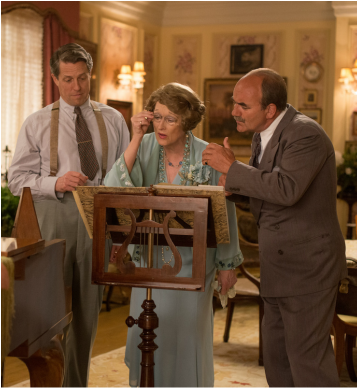Review:
"Florence Foster Jenkins"

Release Date: Aug. 12, 2016
Rating: PG-13 Running Time: 110 minutes The singer in Meryl Streep must be heard. After getting her Stephen Sondheim on in Into the Woods, and rocking out in Ricki and the Flash, Streep steps on stage as an amateur opera singer with a terrible singing voice in Florence Foster Jenkins. There’s some debate in director Stephen Frears’ warmhearted fact-based World War Two-era dramedy as to whether socialite and arts advocate Florence Foster Jenkins was the worst singer to perform in New York City before a paying audience. But Streep and Frears make it clear from the get-go that Jenkins’ not only can’t sing but is tone deaf to her inability to carry a tune. This being Streep, though, Jenkins possesses the “best” worst voice you have ever heard, one that could shatter the windows of the Sydney Opera House while inducing mass laughter. All that Jenkins has going for her is her dream to sing before an adoring public. Luckily, she has the means and ways to pursue her desire to perform at Carnegie Hall. She also is enabled by her doting husband St. Clair Bayfield, who is played by the usually smug Hugh Grant with a genuine sincerity that he’s never been able to display with such ease in his previous performances. By tapping into the true love Bayfield harbors for Jenkins, Grant steers clear of portraying the so-so actor and monologist as a sniveling sycophant intent on keeping his wife content so he can live in the lap of luxury. Instead, his Bayfield is a husband who loves his wife for the kind, generous and expressive person she is. Given the hardships she’s endured in her life, Foster’s happiness is Bayfield’s number one priority. That’s not to say Bayfield is perfect—he spends his evenings with his mistress and future second wife, Rebecca Ferguson’s Kathleen Weatherly—but he’s perfect for Jenkins. And he spends much time, effort and money ensuring Jenkins sings her heart out knowing full well the pain she inflicts on other people’s ears. It is through the eyes of the hysterically incredulous Simon Helberg’s Cosmé McMoon, Jenkins’ pianist, that we see and come to appreciate the lengths to which Bayfield goes to please his wife. The strong bond that exists between Jenkins and Bayfield is undeniable thanks to the familiarity and intimacy that is displayed between the slightly affected but undeniably genuine Streep and the earnest Grant. Yes, Jenkins instantly becomes a figure of ridicule when she opens her mouth to sing, and Frears and screenwriter Nicholas Martin recognize this to the point that they encourage us to laugh at her knowing full well she isn’t in on the joke. They certainly don’t try to pass off Jenkins’ stage appearance as ironic or performance art. But they do make it clear that Jenkins is insulated from the truth by Bayfield, and that enables them to present Jenkins off the stage as an authentic, engaging and passionate lover of music whose burning desire to perform is greater than the talent she possesses. Which probably applies to every karaoke singer who insists on belting out “Don't Stop Believin’” after a few drinks. Robert Sims Aired: Aug. 11, 2016 Web site: http://www.florencefosterjenkinsmovie.com |
|
